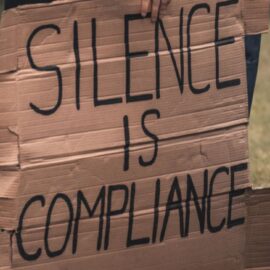

This article is an excerpt from the Shortform book guide to "A Warning" by Anonymous. Shortform has the world's best summaries and analyses of books you should be reading.
Like this article? Sign up for a free trial here .
What is Donald Trump’s personality like? What qualities do you think a president of a nation should exhibit? Does Trump display these qualities?
Voters have the responsibility to weigh a president’s temperament and moral qualities—that is, character—when deciding whether that person is fit to continue in the role of president. The Roman statesman Cicero spelled out the moral qualities he felt were most important, and they are still a useful way to measure our leaders today.
This article will look at how Trump measures up.
Analyzing Donald Trump’s Personality
- “It’s a hellhole, okay? They don’t let you say shithole anymore. But that place is a hellhole and everybody knows it.”
- “Watch them start to choke like dogs.”
- “I don’t f—ing care. Ooh ooh, excuses, excuses. Just stick it to them. I promise you, they will be kissing our asses afterwards.”
- “This guy, have you seen him—’My Pillow.’ He’s unbelievable. He buys all the airtime on TV. It’s terrific. And he’s a big, big Trump supporter.”
Such comments are a window into real Donald Trump’s personality, that is, behind the facade. Often, he’s vulgar, furious and close to losing control. Other times, he comes across as charming or amusing, especially to people encountering him for the first time. Many find it refreshing that he says whatever crosses his mind, in comparison to the scripted presentations of most politicians. But while we’ve had other undisciplined presidents, Trump is in a class by himself. For those who work with him, amusement quickly turns to alarm and apprehension.
Defining Character
In our nation’s history, unprincipled presidents have at times succeeded. They’ve broken promises or cheated on their wives, while still pursuing wide foreign policy or championing important domestic causes.
But the good must outweigh the downside rather than the reverse. James Buchanan has been deemed our worst president because his immoral defense of slavery and Southern slaveholders outweighed his efforts to stave off civil war, which might have been a good.
In the end, a president’s character defines his or her presidency. Further, the president’s behavior sets the tone for public discourse and models civic engagement for young people.
History shows us that power tests a leader’s character. Trump has been tested and his character revealed. His character overshadows the character of all Americans because his reputation is also ours. We need to ask ourselves whether it reflects who we are or aspire to be.
The Roman statesman Cicero believed that to be good or moral, a leader had to demonstrate the “cardinal virtues” of wisdom, temperance, courage, and justice—and that morals determined behavior. The rest of this chapter looks at how Trump measures up to Cicero’s moral qualities necessary for a person of character.
Trump’s Wisdom
Cicero defines wisdom, not as being all-knowing, but as “learning the truth”—which requires diligence in seeking the facts and getting to the bottom of issues. Cicero warned against falsely claiming to know something and allowing yourself to be distracted by trivial matters. He said it’s “dishonorable to stumble…to be ignorant and be deceived.”
However, Trump clearly fails this test by constantly falling for and spreading conspiracy theories and false information or “fake news.” Misinformation and disinformation are Trump’s stock-in-trade. For example, before being elected, he was a fan and promoter of conspiracy monger Alex Jones. He also was a vocal proponent of “birtherism,” the false belief that Barack Obama was born in Kenya (Obama has been proven to be a U.S. citizen). When Sen. Ted Cruz was a primary opponent, Trump asserted that Cruz’s father was involved in the Kennedy assassination. Those are only a few of the many examples.
The president constantly makes or repeats false claims, especially via Twitter. When called out for a false statement, he shrugs it off. So much of what he says is untrue that his appointees and the public are no longer surprised when his lies are revealed. Whether Trump believes the conspiracies he touts or whether he just spreads them to get attention or manipulate others is a matter of speculation. Probably, it’s both.
In terms of Cicero’s admonition that a person of character should diligently pursue the facts and not be ignorant, Trump again fails the standard. He lacks curiosity and has made little attempt to learn what he needs to know in order to do his job.
Trump says he lacks time to read, but he has plenty of time for golf, tweeting, and binge-watching cable programs. Or he insists that he doesn’t need to read because he has common sense and is highly intelligent. He’s been touting his genius and his “very good brain” for years. He often interrupts briefings by saying, “Yeah, I get it. I’m pretty smart, okay?” Yet, Trump can’t remember things he’s said or what people have told him.
He regularly claims to be an expert on issues on which he has scant knowledge. For instance, he has asserted that “nobody knows more than me” about: campaign finance, the courts, trade, taxes, ISIS, the U.S. government, and technology, including drones. Yet, officials have seen him stumble on every topic. Aides have described him as “an idiot and a moron with the understanding of a fifth or sixth grader.” Those are the milder descriptions—most involve a series of expletives.
Trump’s Sense of Justice
When Cicero discusses justice, he’s referring to how a person treats others. He defines a just person as one who:
- Maintains good relationships.
- Gives others their due.
- Honors contracts and promises.
- Is kind and generous.
The president has a different concept of justice: it’s whether he’s being treated fairly or unfairly, in his view. On the perceived unfairness side of the scale, he’s suggested that television networks should be investigated and punished for making fun of him. He spends a great deal of time complaining about news coverage or critics, then “sends White House aides on an endless quest to ‘fix it’.”
Trump’s treatment of others is ruthless rather than “just,” in the way Cicero means it. He has tweeted: “When someone attacks me, I always attack back…except 100X more.” He picks fights with his own appointees, sports stars, and foreign leaders alike. For instance, he attacked Federal Reserve Chairman Jerome Powell, whom he appointed, asking on Twitter, whether Powell or China’s dictator is a bigger enemy of the U.S. Like a schoolyard bully, he assigns his critics derogatory nicknames, often focusing on physical features.
Through intimidation, Trump believes he can get what he wants, rather than what is fair, by Cicero’s standard. He brags about his tactics—for instance, he loves to tell his staff stories about filing spurious legal claims to intimidate rival companies. During the 2016 campaign, he told journalist Bob Woodward that “real power” is achieved by generating fear.
He lacks any sense of proportion. He views political opponents as enemies forever. He’s tweeted about 2016 opponent Hillary Clinton hundreds of times since taking office and pondered how to use his power as president to prosecute her. Trump wants more than electoral defeat—he wants to destroy her.
Another component of justice, according to Cicero, is keeping your promises. Trump’s career is littered with unkept promises, including: unpaid contractors and employees, unpaid bills, and contract violations. He has treated philanthropy similarly, making false promises and claims and using the Trump Foundation to further his business and political interests.
(Shortform note: In November 2019, a New York judge ordered Trump to pay $2 million in damages to a group of charities to settle claims that the foundation misused funds. The foundation is in the process of dissolving.)
It’s clear that Trump doesn’t possess the moral quality of justice, in the sense of treating others fairly. Instead, his focus is self-promotion and destroying anyone who stands in his way.
Trump’s Courage
To Cicero, courage means standing up for what is right. Trump sees himself as fighting for a number of issues. But while leaders take both credit and blame for the way their initiatives turn out, Trump only takes credit. When he loses a fight, he blames someone else for fear of being labeled a loser. For example, he promised repeatedly to repeal and replace Obamacare. When the effort failed, he blamed “weak” senators and his staff.
When it comes to true personal courage, Trump failed a significant test by dodging the draft during the Vietnam War. He avoided service with four deferments for education and one for questionable medical reasons—bone spurs.
Additional components of courage, according to Cicero, are:
- Having the strength not to be swayed by the masses (“the ignorant mob”). Trump incites rather than steering clear of mob behavior. Trump is obsessed with public opinion, whether in the form of likes, retweets, or polls. He brings up polls almost daily. He views them as affirmations of the polling organization’s loyalty to him, not as scientific snapshots of the nation’s moods or as data points to consider—their purpose is to feed his ego.
- Not being driven by greed and the desire for pleasure. Trump has said, “You can’t be too greedy.” He brags constantly about his wealth (“Part of the beauty of me is I am very rich”) and he lives extravagantly.
- Having the ability to remain calm and unfazed in difficult times. Again, Trump demonstrates the opposite. When challenges arise, Trump becomes unhinged. Public events go haywire when Trump is bothered by something, such as a personal grievance or Congressional negotiations. For example, an event on tax reform might veer into a tirade about “millions and millions” of immigrants voting illegally.
In foreign policy, he opts for chest-thumping, like comparing “nuclear buttons” or the size of U.S. nuclear forces with the missiles of North Korean dictator Kim Jong Un. However, these eruptions tend to distract at best and, at worst, threaten to escalate a problem into a crisis.
Also writing about courage, Aristotle warned of the danger posed by a leader who is overconfident, rash, a braggart, and “a pretender to courage,” which is a fair description of Trump and the antithesis of Cicero’s calm, stable leader.
Trump’s Temperance
Cicero described a person who is temperate as showing restraint, modesty, and seemliness, or “conducting oneself in an inoffensive manner.” Also, such a person isn’t careless, and he doesn’t do things rashly or randomly without thinking them through. He or she can handle criticism and isn’t easily triggered.
Again, Trump is the opposite of inoffensive. He’s also completely lacking in restraint— he erupts unpredictably. His behavior is unseemly, from his vulgar comments to grandiose public bragging.
Misogyny
The epitome of vulgarity is Trump’s attitude toward women. Many on his staff are disgusted by his misogynistic behavior, for which he has a long record. Trump talks about women in terms of their appearance and sex appeal—bimbo, great in bed, chubby, not hot, ugly, fat ass, stupid, dog, and so on. In 2015 he tweeted about Hillary Clinton: “If (she) can’t satisfy her husband, what makes her think she can satisfy America?”
Many women may find his comments predatory. He once reportedly said this about himself (in the third person): “Women find his power almost as much of a turn-on as his money.” Of course, his comments on the Access Hollywood tapes about groping women are well-known. Around two dozen women have accused him of sexual misconduct.
In meetings, Trump comments on women’s appearance, clothing, makeup, and weight—sometimes to their faces. He addresses women both inside and outside his administration as “sweetie” and “honey.” Trump is the “Fred Flintstone of the ‘MeToo’ era.”
Rash Reactions
Temperance, according to Cicero, also means thinking things through rather than acting carelessly or recklessly. Trump, however, is infamous for acting on impulse. He brags about making decisions on gut instincts, rather than facts and strategy.
What Trump sees on television is a constant distraction. He’s literally “channel-surfing his way through the presidency.” Television interrupts meetings and Trump’s commentary about it sidetracks conversations. His obsession with TV coverage leads to embarrassing eruptions. On one busy day, when there were important developing issues, he instead focused media attention on minor criticism by George Conway, wife of senior advisor Kellyanne Conway, that had irritated him.
Temperate leaders take criticism calmly and with a grain of salt. However, Trump always takes it personally. He can’t imagine not pushing back aggressively. To him, temperance isn’t a virtue.
The Failed Test of Charlottesville
The August 12, 2017, white supremacists rally in Charlottesville, Virginia, tested Trump’s ability to respond to a civil disturbance. His response answered any remaining questions about his character—he failed the presidential character test. It was a turning point for some members of his staff too.
Organizers of a “Unite the Right” rally had gathered in Charlottesville to protest the removal of General Robert E. Lee’s statue from a park. The night before the scheduled rally, a rogue group of white supremacists marched through the University of Virginia campus, chanting racist slogans. An encounter with university students turned violent.
A counterprotest at the next day’s rally was organized, resulting in more violence. A white supremacist from Ohio drove his vehicle into a crowd of counterprotesters, injuring more than thirty people and killing a woman. The city declared a state of emergency and Charlottesville became international news.
Trump issued a statement from his golf course in New Jersey: “There’s no place for this kind of violence in America.” But he also made waves by condemning the hate and “the violence on many sides,” while failing to denounce the extremists. He couldn’t bring himself to denounce them because they were pro-MAGA supporters. In subsequent days, in spite of his staff’s efforts to redirect him, he repeatedly defended the extremists.
While white supremacists hailed Trump’s statements, they drew bipartisan condemnation. His response to the violence revealed him to be demagogic, shallow, and lacking in courage. To the author, he demonstrated that he’s not in the same league as the American leaders whose portraits hang in the White House. “He isn’t a man of great character, or good character. He’s a man of none.”

———End of Preview———
Like what you just read? Read the rest of the world's best book summary and analysis of Anonymous's "A Warning" at Shortform .
Here's what you'll find in our full A Warning summary :
- An inside look at the chaotic Trump administration written by a senior Trump administration official
- An examination of Trump's authoritarianism and threats to democracy
- The three options that existed for removing Trump from office






